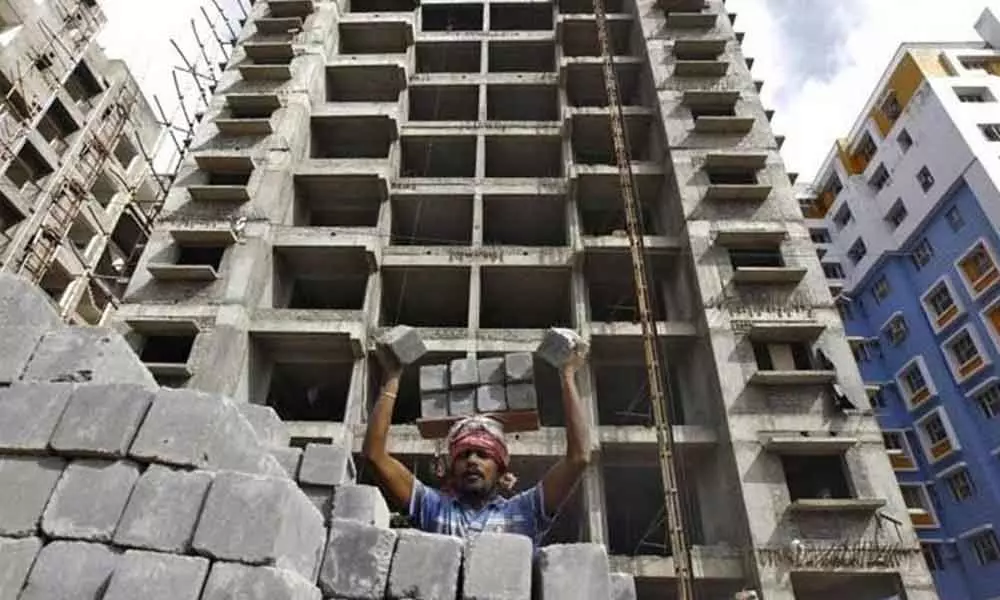Realty sector sentiment plunges to record low

Knight Frank survey reveals that sector’s stakeholders turned pessimistic as Covid-19 crisis is taking heavy toll
The real estate industry sentiment plunged to an all-time low during January-March as stakeholders turned pessimistic, foreseeing an adverse impact of the Covid-19 pandemic on demand-supply and liquidity in the market, a survey showed.
According to property consultant Knight Frank and industry bodies Ficci and Naredco, the real estate sector, which showed signs of revival during the October-December quarter of 2019, has suffered a huge setback because of the Covid-19 crisis with both current and future sentiment index falling to an all-time low in pessimistic zone.
"With the crisis playing havoc on the economy and real estate sector, the current sentiments of the real estate stakeholders in India have dropped to an all-time low of 31 in the first quarter (January – March) 2020," said the 24th Knight Frank-Ficci-Naredco Real Estate Sentiment Index Q1 2020 Survey report.
The future sentiment score, which outlines the market expectations of industry players (including builders and financial institutions) for the next six months, has also fallen to a score of 36 in Q1 2020 against the score of 59 in Q4 2019. A score of over 50 signifies optimism in sentiment, a score of 50 means the sentiment is the same or neutral, while a score of below 50 shows pessimism. Knight Frank India CMD Shishir Baijal said,"The pandemic has created an unprecedented condition which is impacting global markets and societies. There is already a severe shortage of liquidity due to the complete standstill that most economies have come to."
The government and the Reserve Bank of India have provided some stimulus measures, but further support might be required to help the real estate sector and for the economy to stay afloat during the crisis, he said.
Baijal said managing liquidity and sustaining through the length of this pandemic would be critical for economic survival in the post-pandemic era. "The real estate segment specifically will have a longer journey to make. This crisis has retracted the end-user confidence to its lowest levels ever, which will push any kind of real estate purchase decisions to the distant future," he said, and pitched for the relief package to bring the sector on track.
The lockdown will translate into a vicious sequence of stalled construction, delays in project deliveries, delays in loan repayments and debt servicing to banks and an overall slump in demand due to uncertainties in employment and salary cuts, the report said.
Stakeholders' sentiment with regard to the economic scenario for the next six months paints a dismal picture with 76 per cent participants being of the opinion that the overall economy is headed for a downward spiral. About 70 per cent of the stakeholders believe that the flow of funds to the real estate sector might get worse or remain at the current levels in the coming six months.
Sanjay Dutt, MD and CEO of Tata Realty and Infrastructure, and also Chairman of FICCI Real Estate Committee, said, the government has proactively taken measures to prevent the spread of virus, save lives and livelihoods besides providing some procedural regulatory relief. "It is time to strengthen revival efforts with a strong fiscal boost that shall serve as a stimulus to ensure that the economy recovers sooner than later. "As gradual recovery begins with improvement on this pandemic and things settle over a 12-24 month time horizon. We will see a long drawn extended U-shaped recovery for the residential segment but a faster V-shaped recovery for the office segment in the country. Sentiments perhaps may return earlier," Dutt said. Niranjan Hiranandani, National President, Naredco and Founder, and MD of Hiranandani Group said, the recovery curve will depend on the fiscal stimulus rolled out by the government machinery.
"There will be a slowdown across the industry post Covid-19 crisis. The industry is facing an acute working capital crisis which is essential to restart the business and keep it moving. "We have all pinned our hopes on government intervention to salvage the loss created by the crisis with its big fat fiscal stimulus to get the growth trajectory back on track" Hiranandani said. He said this crisis has definitely put people to re-channelise their thoughts and behavior, which will lead industry to the structural trends.
"The biggest learning is the change in perception of owning one's house which embeds a deep sense of safety and security in the period of crisis. This shall be the next driving force to generate long term sustainable housing demand for the segment," he added.











